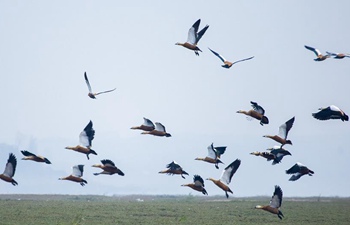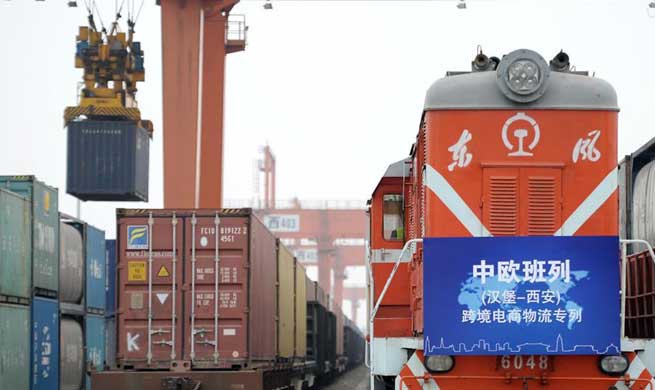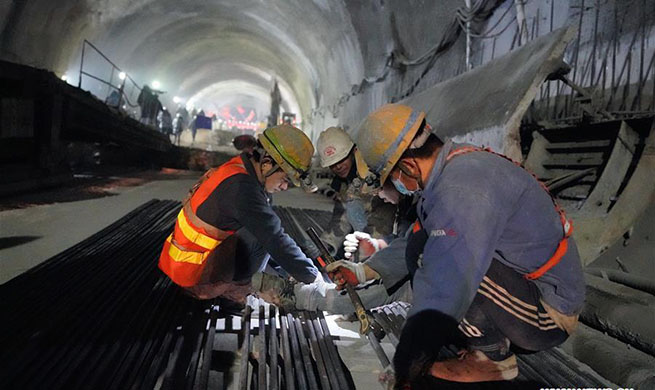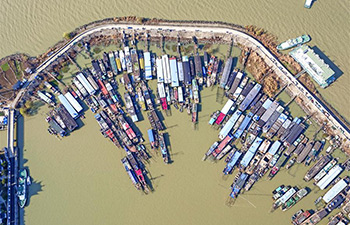by Raimundo Urrechaga
HAVANA, Dec. 13 (Xinhua) -- Until recently, the sight of distracted cellphone users walking on the streets with eyes fixed on their mobile screens was unusual in Cuba.
Not anymore.
Cubans across the country have been glued to their phones since the national telecom company ETECSA launched mobile Internet service a week ago.
ETECSA introduced the highly-anticipated 3G service on Dec. 6 as part of a government policy to modernize the communications system in Cuba and boost Internet access in a country where most homes still lack connectivity.
"The new service is great. It gives us the opportunity to connect to the Internet from our homes or anywhere. It will make our lives easier," Gabriela Reyes, a university student, told Xinhua.
Since 2015, most Cubans were connected to the Internet at some 1,200 Wi-Fi hotspots set up at public spaces, including parks, hotels and cybercafes.
"Being able to browse the Internet from our mobiles is very convenient," agreed Luth Lilian, a 25-year-old medical student.
However, there was one downside, she noted.
"The speed is really fast but prices are high," said Lilian.
ETECSA is offering packages ranging from 600 megabytes for about seven U.S. dollars to four gigabytes for around 30 U.S. dollars, in line with rates elsewhere but expensive for a country where monthly wages are low as the government provides free healthcare, education, housing and food subsidies.
Government authorities say prices will drop next year as the service continues to develop.
"We will spend on infrastructure, in keeping with our financial possibilities, over the coming months and also start installing 4G technology, which is already used worldwide," Jose Luis Perdomo, the island's minister of communications, said recently.
"It's the political will of the country's leadership that our citizens use the Internet as a tool for personal development and knowledge," said Perdomo.
State employees earn on average about 30 U.S. dollars a month, so spending on Internet access is costly.
"Having the Internet on our cellphones is a step forward but I think it's very expensive," said Anabel Quiaro, a young Cuban.
"The amount of data for the minimum rate is too small to fully surf the web and social media. I don't think I'll buy it," she added.
A plan that lets you pay per data consumption is also available, with preferential rates for local websites.
"I think there should be cheaper packages and more data. ETECSA should also offer to pass on remaining megabytes to the next month or sell an unlimited plan," said student Ernesto Pedia.
Pedia, who studies at the University of Havana, opted for the cheaper plan, and is pleased with the speed and efficiency of the package.
The new service was gradually introduced according to users' phone numbers to avoid the congestion that struck Cuba's mobile network during a series of heavily criticized tests this year.
Now all 5.3 million cellphone users can access the service if they have a 3G compatible device.
Apart from the public Wi-Fi zones, the government says 670 Internet cafes around the country provide access for a dollar an hour.
"We are continuing to make progress in digitizing our country," Cuban President Miguel Diaz-Canel posted on Twitter last week to celebrate the launch of the service.
3G antennas offer coverage to some 66 percent of the island.
"It's perfect that I don't have to go to parks or Wi-Fi zones, and can connect from my room with my family in my country. I think if prices go down a bit, everything will be perfect," said Lilian.
Lidia Tomasina, a state employee who regularly visits a Wi-Fi park near Havana's popular Coppelia ice cream shop, in the city's Vedado neighborhood, said the service isn't for her.
"The idea seems great but I don't like the data packages. I'm not really interested in buying that offer. It's cheaper for me to use Wi-Fi zones," she said.
According to official data, there are more than 1,800 public Internet access sites around the country and over 5.9 million locals accessed the web last year.
Home Internet access became available in 2017, and according to ETECSA, over 60,000 Cubans have the service installed.
In February of last year, the government approved a comprehensive policy to boost new technologies and expand connectivity at state institutions, universities and research centers, and promote online banking, e-commerce and the creation of websites for different local governments and institutions.

















